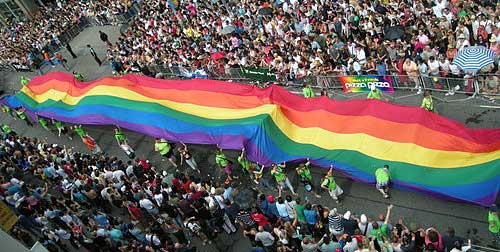Repost from Human Rights First | by Innokenty Grekov
Human Rights First calls on governments to abide by commitments to respect the fundamental freedoms of assembly and association and to take adequate measures to ensure security and protection for all. However, many States have failed to fully ensure these fundamental freedoms, and a number of governments actively suppress them. Lesbian, gay, bisexual, transgender, and intersex (LGBTI) individuals have been particularly affected by this suppression of rights and continue the uphill struggle for the right to freedom of assembly and association.
Gay pride parades offer an opportunity for many LGBTI individuals to exercise the right to freedom of expression. Historically, gay pride parades have come to symbolize the resistance to intolerance and bigotry that surround LGBTI people in their daily lives. Restricting these peaceful demonstrations is particularly damaging and unacceptable.
Gay pride parades and events, particularly in Eastern and Southeastern Europe and in the former Soviet Union have resulted in political diatribes attacking people of minority sexual orientations from political and other leaders, inadequate police protection, and acts of harassment and violence against the participants. The perpetrators of such violence are rarely held accountable. Apart from Estonia, Lithuania, and Latvia, municipal officials in the former Soviet republics have yet to approve an application for a pride parade.
While permits for public events and demonstrations are routinely denied to the representatives of LGBTI rights groups, authorities usually allow marches requested by right-wing, ultranationalist, anti-immigrant, and neo-Nazi organizations. Often, municipal officials allow antigay rallies organized to protest the pride parade while simultaneously banning the LGBTI event.
Recent examples of official interference include (ordered chronologically):
- Russia. On May 17, 2011, the Moscow City Hall has banned Moscow Pride for the sixth consecutive year. City officials cited numerous letters from public officials, religious organizations and private citizens urging the authorities to prohibit a demonstration. Similar bans were pronounced illegal by the European Court of Human Rights (ECHR) in October 2010. Moscow Pride has never been officially permitted by the authorities that banned gay pride events from 2006-2010.
- Hungary. On February 18, 2011, the Budapest Metropolitan Court has overturned the Budapest police chief’s decision to withdraw the permission to hold the annual Budapest Gay Pride Parade—after LGBTI activists requested to extend the route. The march is scheduled to take place along the extended route in June 2011. The police have since reaffirmed the intent to cooperate with the LGBTI activists.
- Ukraine. The Kharkiv City officials issued a ban on a pride parade that would coincide with a major city celebration on August 23, 2010. The pride march organizers requested permission for a demonstration involving a thousand people.
- Belarus. In May 2010, the Minsk City officials declined to issue a permit for a pride parade, citing traffic concerns. The demonstration went ahead despite the ban and was dispersed by riot police. At least twelve activists were arrested, fined, and held in custody (some were detained for several days). In August 2011, Belarusian activists will once again apply for a permit for the march planned for September.
- Lithuania. A brief court ban, initiated by the Office of the Prosecutor, on Baltic Pride was imposed in May 2010. The Vilnius District Administrative Court’s decision to suspend the permit given by the Vilnius municipality was eventually overturned by the Supreme Administration Court, which emphasized that the rights to assembly and expression are guaranteed by the European Convention and the government is obligated to defend them, and the march went ahead as originally planned on May 8, 2010. The event was spearheaded by activists from all three Baltic countries—Lithuania, Latvia, and Estonia—and many guests from elsewhere in Europe.
- Moldova. In April 2010, the Appeals Court of Chisinau upheld a ban on an equality march organized by LGBTI groups. Similar bans were issued by the city authorities in 2005—2007, and neofascist groups succeeded in pressuring the organizers to cancel the march in 2008. In 2009 and 2011, the organizers decided to organize public events and flash-mobs (as opposed to requesting to march in the streets).
Best Practice Example: Serbia. “One significant human rights achievement was marked at the October 10 Pride Parade, when the government affirmed the freedom of assembly of the LGBT community. Unlike previous years, the government worked closely with planners to prepare for the event, and police successfully protected the marchers despite widespread violent protests by extremist groups.” (State Department’s HR Report).
Find Human Rights First on Twitter



0 Responses to “Human Rights First calls for the respect of fundamental freedoms of assembly and association”